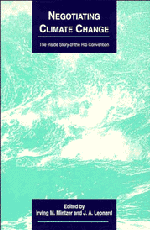Book contents
- Frontmatter
- Contents
- Acknowledgements
- Commonly Used Acronyms
- Foreword
- Part I Background
- Part II Views from Within the Ring
- 3 Exercising Common but Differentiated Responsibility
- 4 The Beginnings of an International Climate Law
- 5 Constructive Damage to the Status Quo
- 6 The Climate Change Negotiations
- 7 A Personal Assessment
- 8 The Road to Rio
- 9 A Failure of Presidential Leadership
- 10 Looking Back to See Forward
- Part III The Outside Edges In
- Part IV Prospects for the Future
- Appendix: The Framework Convention on Climate Change
- Index
3 - Exercising Common but Differentiated Responsibility
Published online by Cambridge University Press: 01 June 2011
- Frontmatter
- Contents
- Acknowledgements
- Commonly Used Acronyms
- Foreword
- Part I Background
- Part II Views from Within the Ring
- 3 Exercising Common but Differentiated Responsibility
- 4 The Beginnings of an International Climate Law
- 5 Constructive Damage to the Status Quo
- 6 The Climate Change Negotiations
- 7 A Personal Assessment
- 8 The Road to Rio
- 9 A Failure of Presidential Leadership
- 10 Looking Back to See Forward
- Part III The Outside Edges In
- Part IV Prospects for the Future
- Appendix: The Framework Convention on Climate Change
- Index
Summary
In February 1991, at the first plenary session of the Intergovernmental Negotiating Committee, the prospect of successfully negotiating a Framework Convention on Climate Change seemed problematical at best. The complexity of the issues, the continuing scientific uncertainty about the causes and the impacts of the historically observed climate change, the wide range of countries' diverging views as to what action (if any) should be taken, the decision by many southern countries that the responsibility for action to reduce the risks of climate change should fall to the industrialized nations—each of these aspects of the situation in which negotiations began seemed to present insurmountable obstacles to the early conclusion of a worldwide agreement. They certainly made it seem unlikely that any agreement could be reached which would include significant commitments to emissions reductions or legal constraints on economically important activities. To complicate the situation further, economic crises and changing political priorities focused public interest on other challenges. For those at the highest levels of government, in the industrial countries in particular, the collapse of the Berlin Wall, the Gulf war, and the upheaval in Eastern Europe emerged in turn to divert political attention away from the climate issue.
The result obtained one and a half years later—156 signatures to the Convention gathered during fifteen days at the United Nations Conference on the Environment and Development (UNCED, also called the Earth Summit) in Rio de Janeiro—must be assessed in light of these considerations.
- Type
- Chapter
- Information
- Negotiating Climate ChangeThe Inside Story of the Rio Convention, pp. 77 - 96Publisher: Cambridge University PressPrint publication year: 1994
- 3
- Cited by



